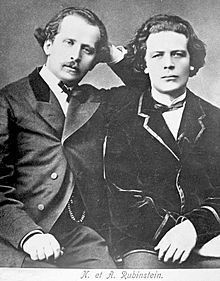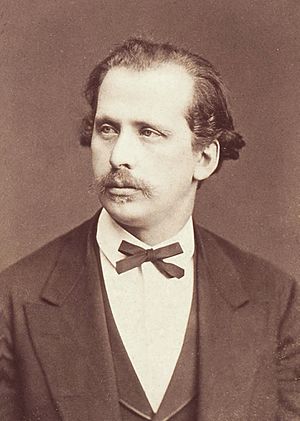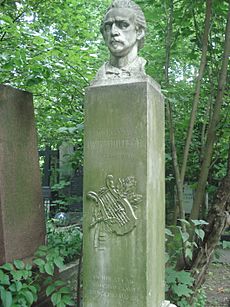Nikolai Rubinstein facts for kids
Nikolai Grigoryevich Rubinstein (born June 14, 1835 – died March 23, 1881) was a talented Russian pianist, conductor, and composer. He was the younger brother of another famous musician, Anton Rubinstein. Nikolai was also a close friend of the well-known composer Pyotr Ilyich Tchaikovsky.
Contents
Early Life and Education
Nikolai Rubinstein was born in Moscow, Russia. His parents were Jewish, and his father had just opened a small factory there. Nikolai showed a gift for playing the piano at a very young age.
When his family lived in Berlin from 1844 to 1846, he continued his piano studies with Theodor Kullak. He also learned about harmony and counterpoint (how different musical parts fit together) from Siegfried Dehn. During this time, both Nikolai and his brother Anton gained the attention of famous composers like Felix Mendelssohn and Giacomo Meyerbeer.
After his family returned to Moscow, Nikolai studied with Alexander Villoing. He even toured with Villoing, performing for audiences. To avoid being forced into the army, Nikolai studied medicine. He graduated from Moscow State University in 1855.
Founding the Moscow Conservatory

Because of his amazing piano playing, Nikolai Rubinstein was very popular in Moscow's wealthy homes. In 1859, he helped start the Moscow branch of the Russian Musical Society.
Then, in 1866, he co-founded the famous Moscow Conservatory with Prince Nikolai Petrovitch Troubetzkoy. Nikolai Rubinstein became the director of the Conservatory and stayed in that role until he passed away in 1881.
Friendship with Tchaikovsky
Nikolai Rubinstein hired Pyotr Ilyich Tchaikovsky, who had just finished his studies at the Saint Petersburg Conservatory. Tchaikovsky began teaching harmony at the Moscow Conservatory.
Rubinstein greatly supported Tchaikovsky's musical creations and often performed his pieces. While they had a famous disagreement about Tchaikovsky's First Piano Concerto at first, Rubinstein later changed his mind. He became a strong supporter of the concerto.
In 1879, Rubinstein conducted the first performance of Tchaikovsky's opera Eugene Onegin. After Rubinstein died from tuberculosis in Paris, Tchaikovsky wrote his beautiful Piano Trio in A minor to honor his memory.
Supporting Other Composers
Nikolai Rubinstein also conducted and performed music by a group of nationalistic composers known as "The Five". He supported them much more than his brother Anton did.
In 1869, when the leader of "The Five," Mily Balakirev, had to leave his conducting job, Rubinstein offered his support. He played at concerts as Balakirev's guest. Rubinstein also gave the very first performance of Balakirev's famous piano piece, Islamey.
Pianist Style
Nikolai Rubinstein was considered one of the best pianists of his time. Even though his brother Anton is more famous today, many people thought Nikolai was equally talented.
His piano playing style was quite different from his brother's fiery approach. Nikolai preferred a more controlled and classical style, similar to Clara Schumann, rather than the showy style of Franz Liszt. Music experts say his performances highlighted the structure of a piece and showed great clarity in every detail.
It is said that Anton Rubinstein once mentioned that if Nikolai had worked even harder, he could have been the better pianist of the two brothers.
Notable Students
Nikolai Rubinstein taught many talented piano students. His most famous students included Sergei Taneyev, Emil von Sauer, and Alexander Siloti. Sauer and Siloti later went on to study with the legendary Franz Liszt. Other important students were Ernst Jedliczka and Henryk Pachulski.
As a Composer
Rubinstein also composed some music, though it is not as well-known today. Among his more popular works are his Tarantella in G minor and his Fantasia on a Theme by Robert Schumann, both written for solo piano. When asked why he didn't compose more, he jokingly replied that his brother Anton "composed enough for three!"
See also
 In Spanish: Nikolái Rubinstein para niños
In Spanish: Nikolái Rubinstein para niños



